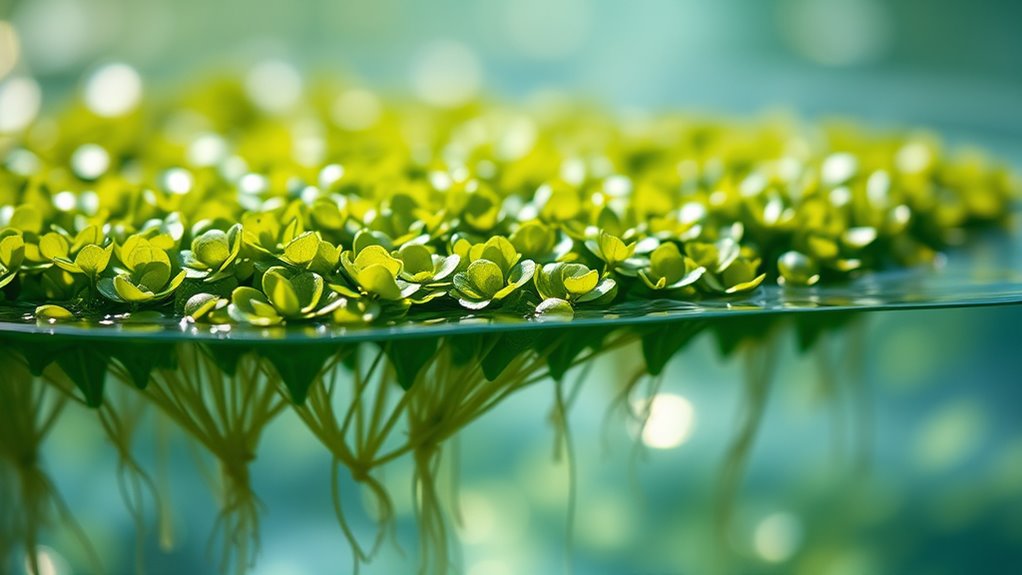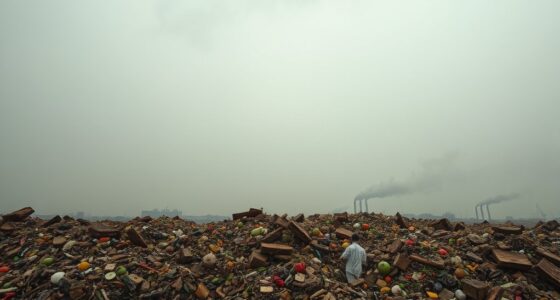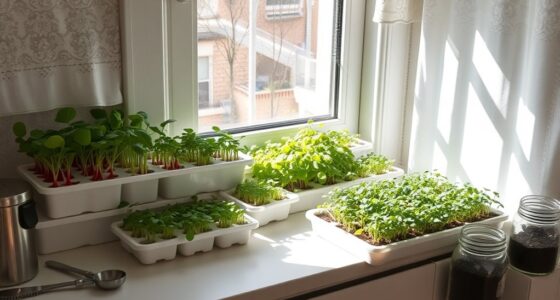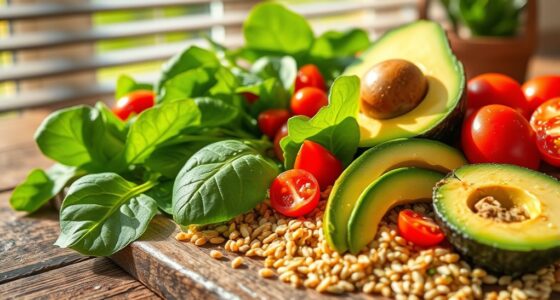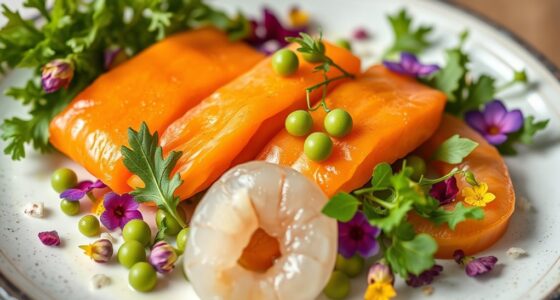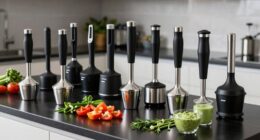Water lentils, also known as duckweed, are a promising sustainable protein source that can transform your food choices. They grow rapidly on water, including wastewater, with minimal resources, reducing environmental impact. Packed with essential nutrients like vitamins and complete proteins, they support healthy diets while helping conserve land and water. If you want to understand how these tiny plants could shape the future of food, there’s more to discover beyond this quick overview.
Key Takeaways
- Water lentils grow rapidly with minimal resources, offering a sustainable and scalable source of protein.
- They require less land and water compared to traditional crops, reducing environmental impact.
- Rich in complete protein, vitamins, and minerals, supporting global nutritional needs sustainably.
- Capable of growing in wastewater, aiding nutrient recycling and pollution reduction.
- Their ease of cultivation and multiple harvests per year make them a reliable future food source.
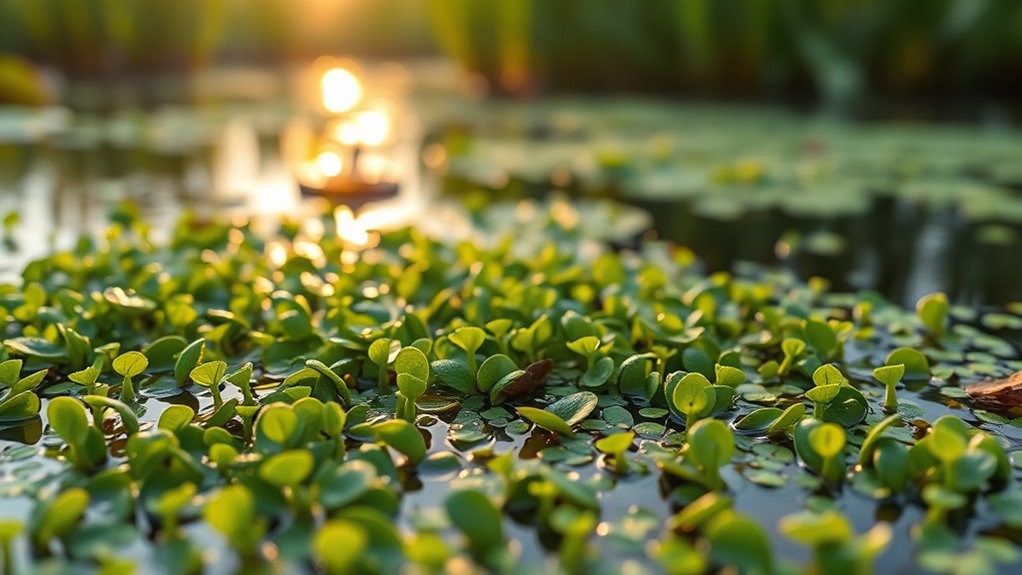
Have you ever heard of water lentils? If not, you’re missing out on a tiny aquatic plant that’s rapidly gaining attention as a promising solution to some of today’s biggest food sustainability challenges. Water lentils, also known as duckweed, are small, floating aquatic plants that grow quickly and require minimal resources. They’re making waves in the world of aquaculture sustainability because they can be cultivated efficiently, using less land and water than traditional crops or livestock. This makes them an excellent option for producing protein-rich food without putting extra strain on fragile ecosystems or depleting finite resources. Their rapid growth cycle means you can harvest large quantities in a short amount of time, making water lentils an appealing choice for scalable food production. Plus, they can thrive in various water conditions, including wastewater, which helps recycle nutrients and reduce pollution.
Beyond their environmental advantages, water lentils pack a powerful nutritional punch. They’re loaded with essential amino acids, making them a complete protein source—perfect for feeding a growing global population. Unlike some plant-based proteins that lack certain nutrients, water lentils contain significant amounts of vitamins, minerals, and antioxidants. They’re rich in protein, but they also supply vitamin B12, iron, calcium, and other micronutrients that support overall health. Because they grow in water, they don’t require the extensive land use or intensive farming methods associated with traditional crops, which often involve heavy pesticide and fertilizer use. This means you get nutrient-dense food that’s produced with a much smaller environmental footprint.
Cultivating water lentils is straightforward and sustainable. They grow rapidly, often doubling their biomass in just a couple of days under ideal conditions. This rapid growth not only improves aquaculture sustainability but also ensures a consistent and reliable source of nutrition. Farmers and food producers are increasingly turning to water lentils as a way to diversify their crops and reduce dependence on resource-intensive agriculture. Plus, since they can be harvested multiple times a year, they provide a steady stream of nutritious food without the long wait associated with traditional crops.
Frequently Asked Questions
How Does Water Lentil Cultivation Impact Local Ecosystems?
You might wonder how water lentil cultivation influences local ecosystems. When grown responsibly, it can boost aquatic biodiversity by providing habitats and reducing water pollution through natural filtration. However, if overdone or poorly managed, it could disrupt native species or lead to invasive growth. You should consider sustainable practices to guarantee water lentils support ecosystem health without harming the environment.
Are Water Lentils Suitable for Gluten-Free Diets?
Think of water lentils as a green, gluten-free treasure chest. They’re naturally suitable for gluten-free diets, but you should check for gluten-free certification to verify safety. Be cautious of cross-contamination concerns during processing, which could introduce gluten traces. When properly certified and handled, water lentils make a nutritious, safe addition to your gluten-free meals, offering a sustainable protein source without gluten worries.
What Are the Economic Benefits for Small-Scale Farmers?
You can benefit economically by cultivating water lentils, as they offer small-scale farmers better market access and income diversification. Growing water lentils allows you to tap into new markets, both local and international, increasing your sales opportunities. Plus, diversifying your crops with water lentils helps reduce financial risks, ensuring a steadier income stream. This sustainable crop can boost your farm’s profitability while contributing to environmental conservation.
Can Water Lentils Be Integrated Into Existing Food Processing Systems?
You can integrate water lentils into existing food processing systems with relative ease, as they require minimal processing. About 85% of current processing equipment can be adapted for water lentils, streamlining supply chain adaptation. This integration enables quick scaling and reduces costs. By incorporating water lentils into your supply chain, you embrace sustainable protein sourcing while optimizing your processing workflows efficiently.
What Are the Potential Health Risks Associated With Water Lentil Consumption?
You should be aware of potential health risks when consuming water lentils. Toxicity concerns exist if they aren’t cultivated properly, leading to possible contamination with harmful substances. Additionally, allergenicity risks may arise, especially if you’re sensitive to certain plant proteins. It is crucial to source water lentils from reputable suppliers and monitor for any adverse reactions to ensure safe consumption. Always consult with a healthcare professional if you’re uncertain.
Conclusion
Imagine a world where your plate is filled with vibrant, emerald water lentils, floating gracefully on shimmering ponds. These tiny greens thrive effortlessly, offering a sustainable, protein-packed solution that nurtures the planet. By embracing water lentils, you become part of a future where food grows quietly in harmony with nature, turning simple waters into sources of nourishment. It’s a small change that can ripple outward, transforming the way we feed ourselves and care for our Earth.
